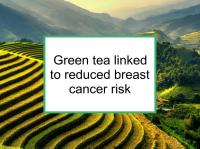A new study has reported that green tea phytochemicals can prevent breast cancer caused by long-term, low-level exposure to environmental carcinogens in a laboratory model of breast cancer. Population and laboratory studies have reported that green tea components may be useful in preventing breast cancer.
Breast cancer in women without a family history of the disease is attributable to exposure to a variety of factors, which contribute to a multi-year, multi-step, and multi-path process of carcinogenesis that includes cumulative genetic and epigenetic alterations in breast cells. Epigenetic changes are potentially reversible modifications in gene expression that can be induced by certain dietary and environmental factors. Cumulative genetic and epigenetic alterations can transform normal breast cells into precancerous cells and finally into cancer cells.
In conducting previous research, the authors developed a cellular model to represent breast cell carcinogenesis that is induced by cumulative exposures to low levels of environmental carcinogens. This chronic carcinogenesis model was used in the present study to investigate the activity of green tea flavonoid extract.
The most well known green tea flavonoid is epigallocatechin gallate (EGCG). The green tea extract was found to be effective in suppressing cancer-associated changes caused by long-term, low-level exposure to two carcinogens. This anti-cancer activity occurred at a physiologically achievable concentration of the green tea extract that did not harm normal cells.
The authors also determined that the green tea extract acted by modifying carcinogen-induced increases in cell proliferation, DNA damage, alterations in gene expression and other changes known to contribute to cancer development.
Please see our article on green tea for more information on how it may reduce breast cancer risk, interact with certain breast cancer treatments, and influence outcome.
